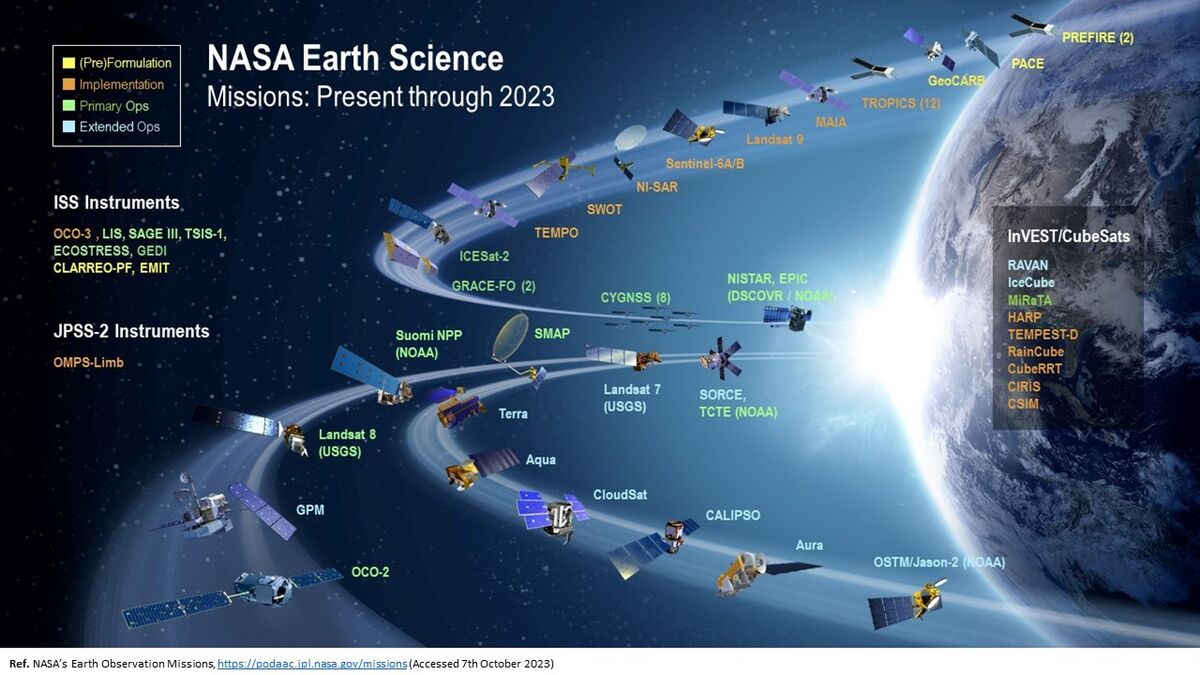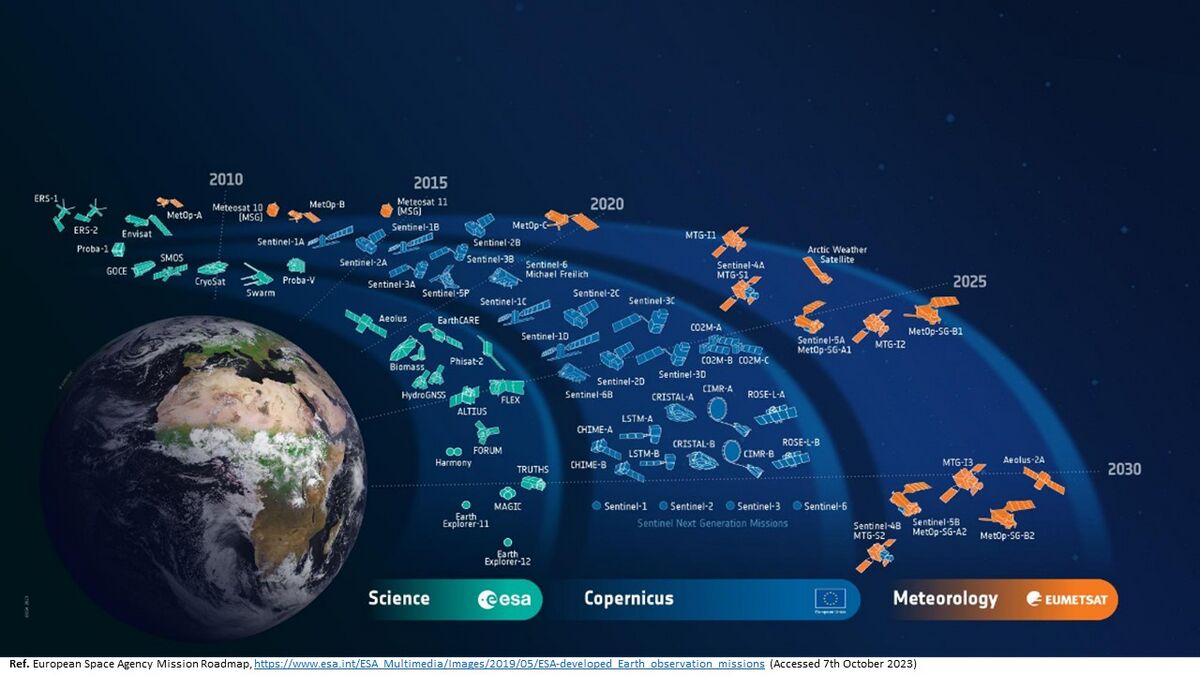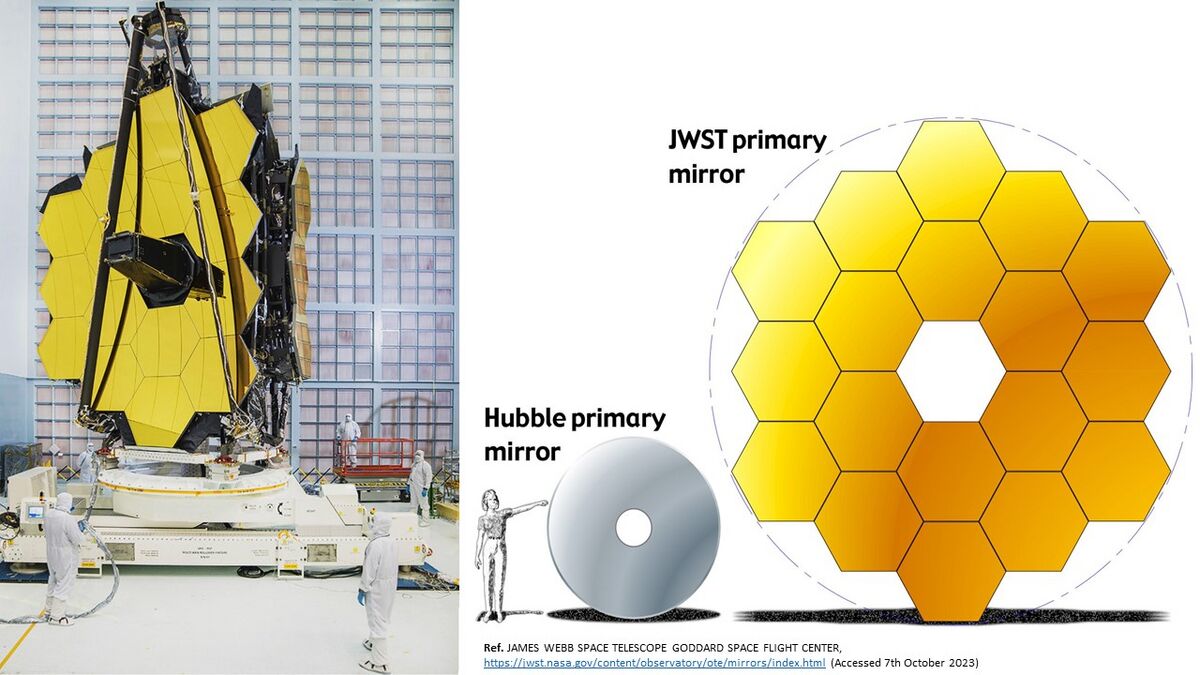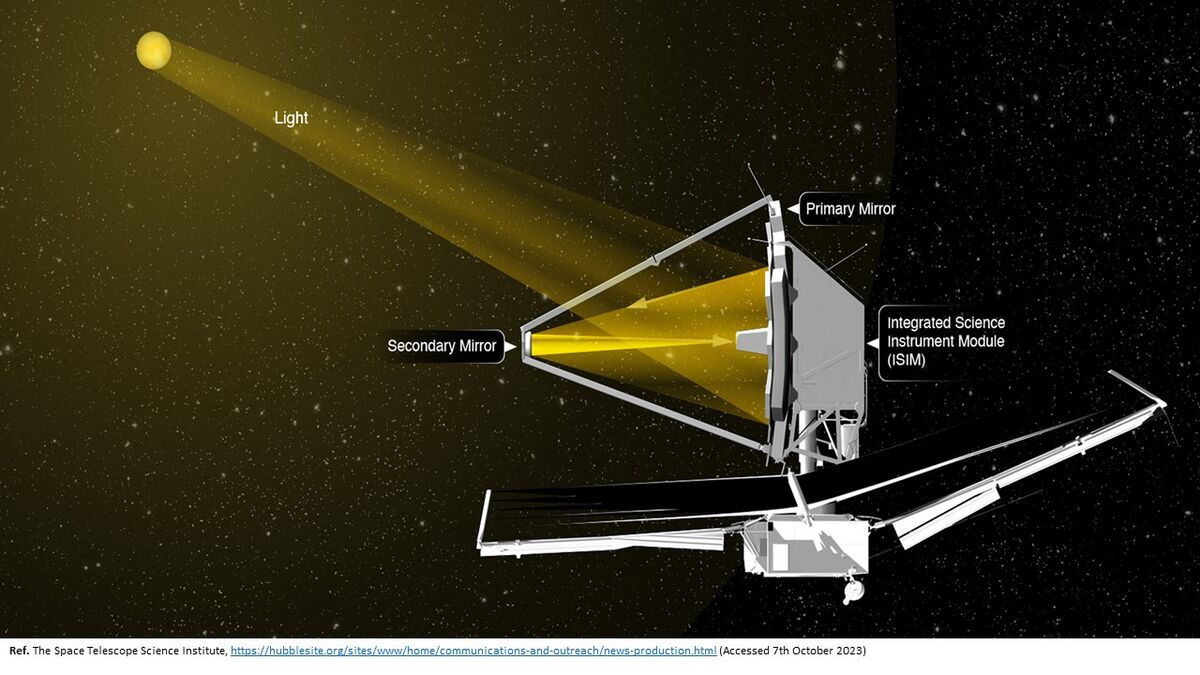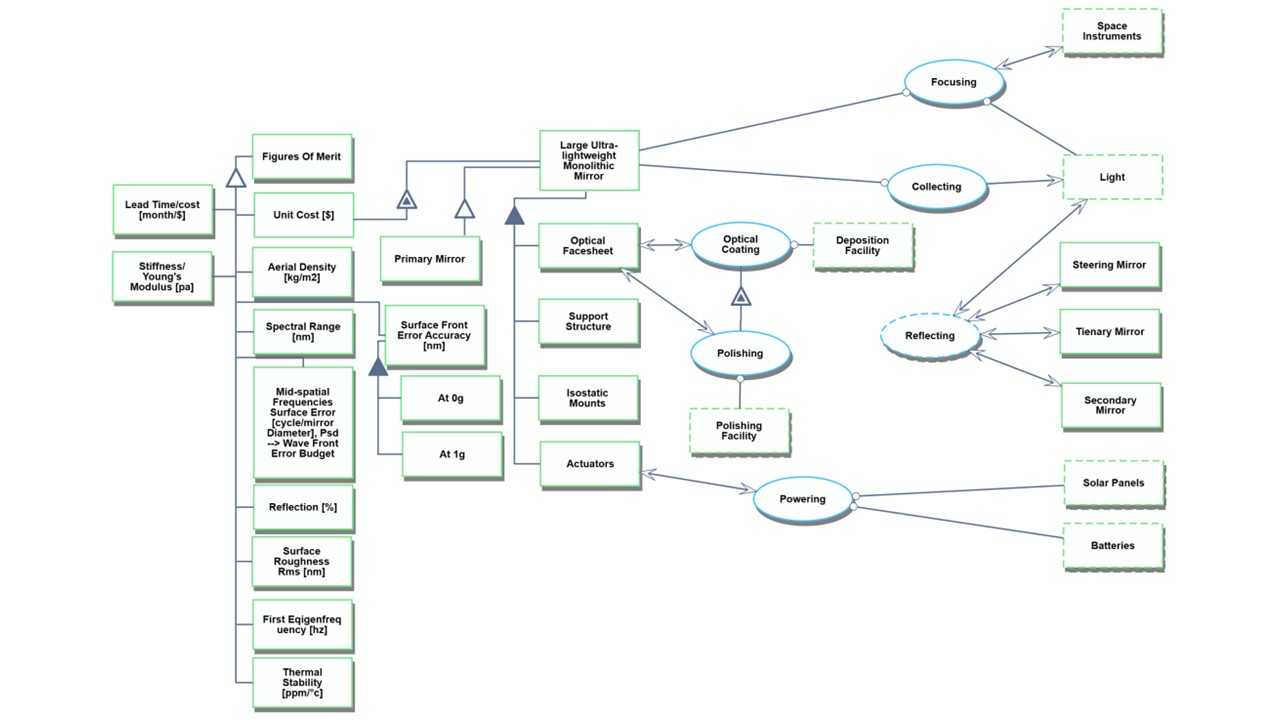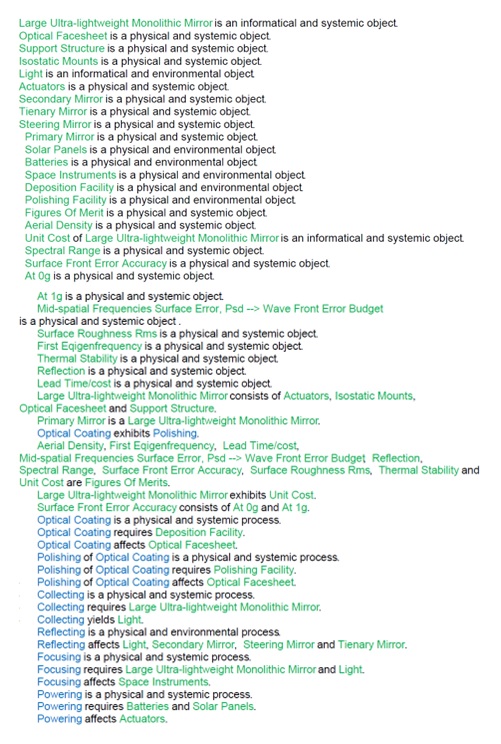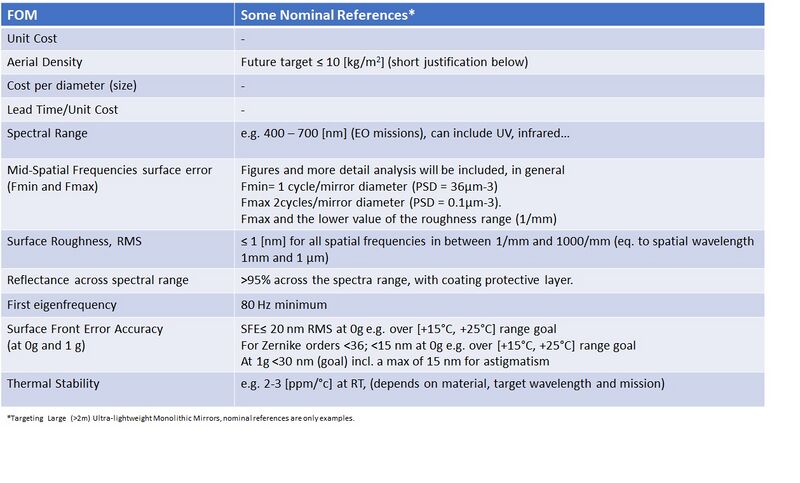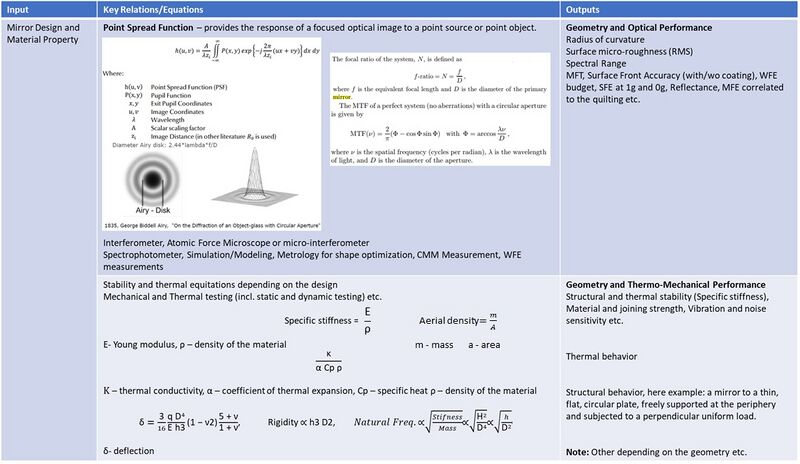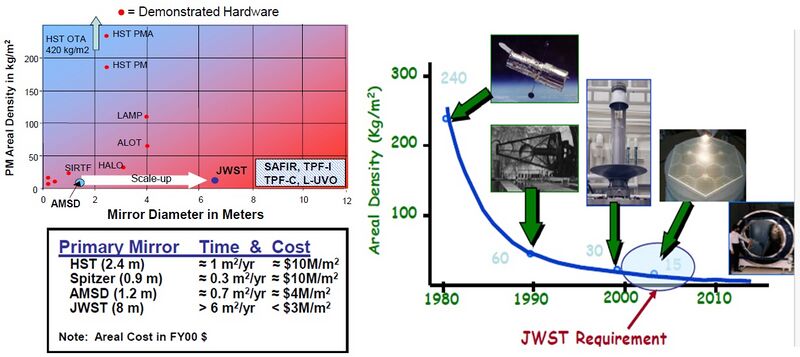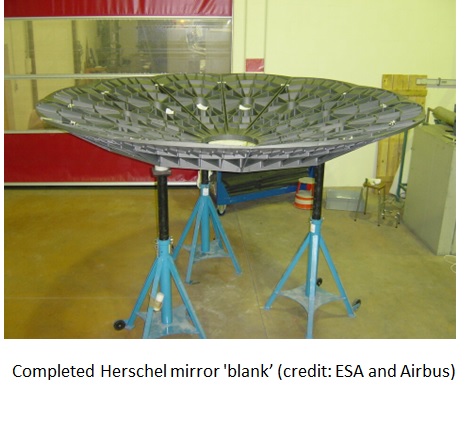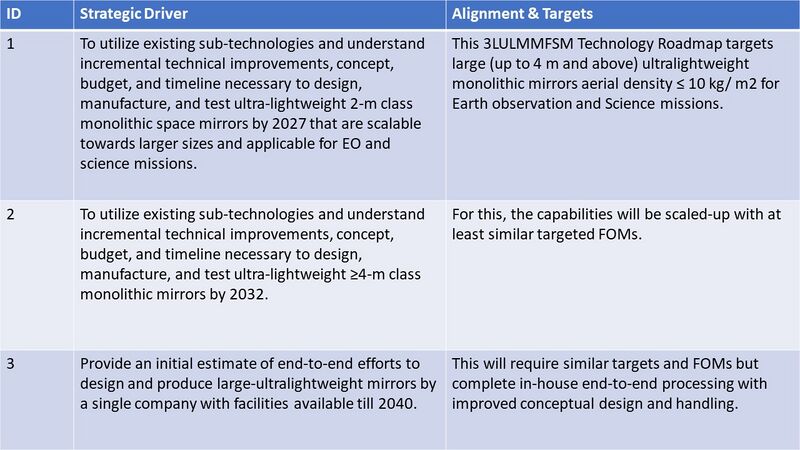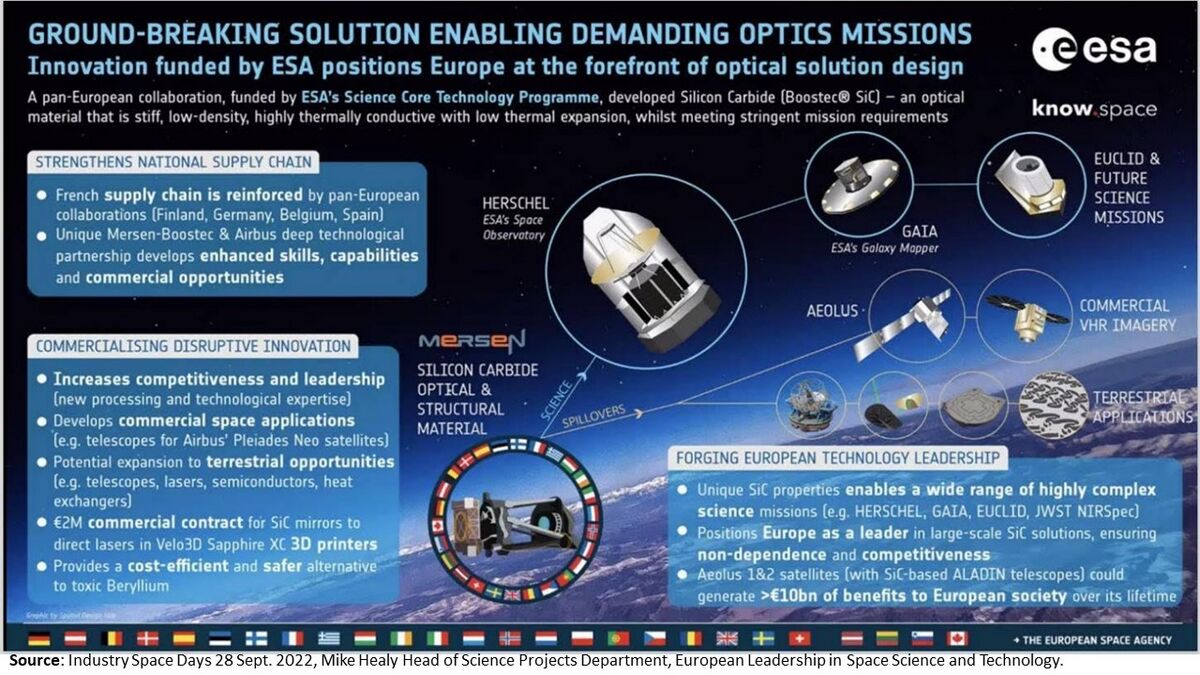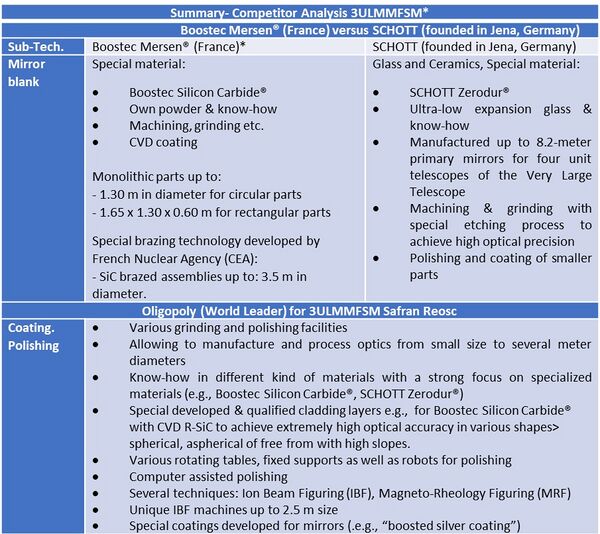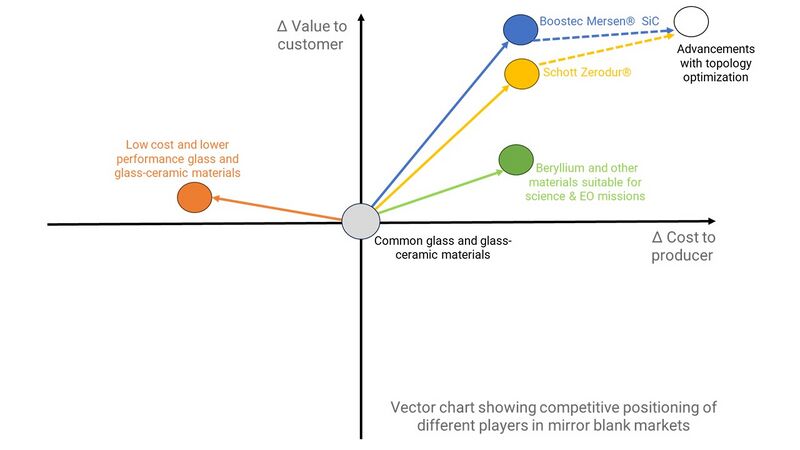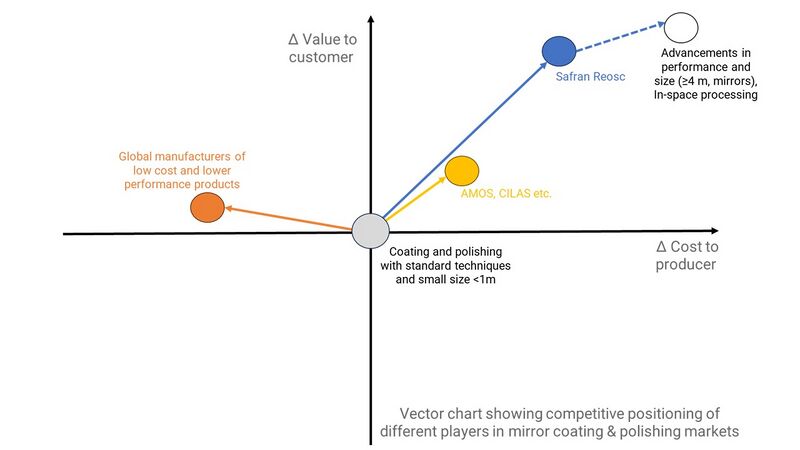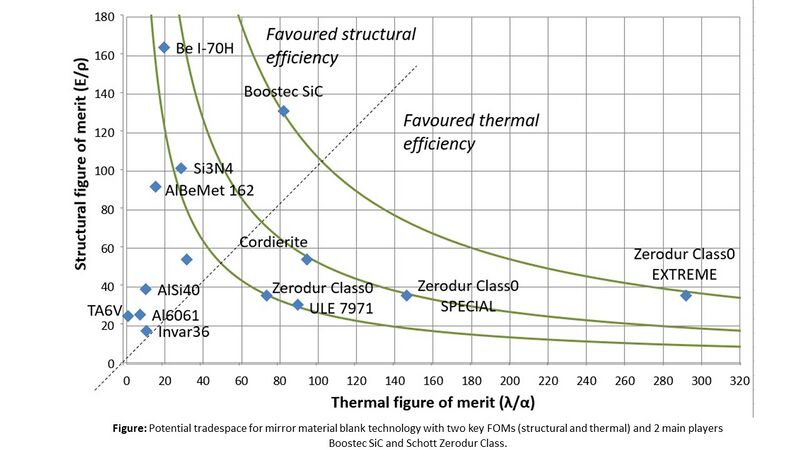Difference between revisions of "Large Ultra Lightweight Monolithic Mirros for Space Missions"
| Line 124: | Line 124: | ||
For mirror blanks, other indirect and direct competitors usually focus on more common glass or glass-ceramic materials (BK7, fused silica…), whereas for polishing and coating other companies are limited to more classical materials and smaller dimensions (.e.g. Magneto-Rheology Figuring <1 m mirrors). | For mirror blanks, other indirect and direct competitors usually focus on more common glass or glass-ceramic materials (BK7, fused silica…), whereas for polishing and coating other companies are limited to more classical materials and smaller dimensions (.e.g. Magneto-Rheology Figuring <1 m mirrors). | ||
[[File:3LULMMCompetitors.jpg| | [[File:3LULMMCompetitors.jpg|600px]] | ||
Revision as of 20:32, 1 November 2023
Technology Roadmap Sections and Deliverables
This is a technology roadmap for:
- 3LULMMFSM - Large Ultra-Lightweight Monolithic Mirrors for Space Missions
Large-Ultra Lightweight Monolithic Mirrors (LULMM) (also enable segmented designs for space missions) - Mirrors are enabling technology for space based telescopes. Primary mirror size and quality is directly traceable to telescope performance. Every engineering advancement in space mirror technology has resulted in improved earth observation and science performance. Future large scale optical instruments for Earth Observation and Science missions will require very large primary mirrors with extreme light weighting. There has been significant technical evolution realized over the last years. However, the current level of light weighting is reaching the limit of classical techniques and decreasing optical performances due to side efforts, causing mission concepts with active correction capabilities which could be simplified by using alternative techniques for lighter and stiffer primary mirrors. The weight can be drastically reduced with designs based on a thin optical face sheets, which are attached to a stiff and lightweight support structures (e.g. honeycomb…).
Ultra-precision mirrors are setting the space telescope design. Rare are the components whose design lies at such optimal crossroads between 3 major engineering fields (optical, thermal, and mechanical) while challenging manufacturing and integration capacities in these fields. The recent spotlight on JWST's magnificently gigantic golden primary mirror and the incredible pictures it helps create (figure below) has brought mirror design to the forefront of the public eye and the engineers. Yet, the subtle and skillful art and efforts that underlie a genuinely successful mirror design are not always prominent. This roadmap addresses space mirror technologies' previous, current, and future needs.
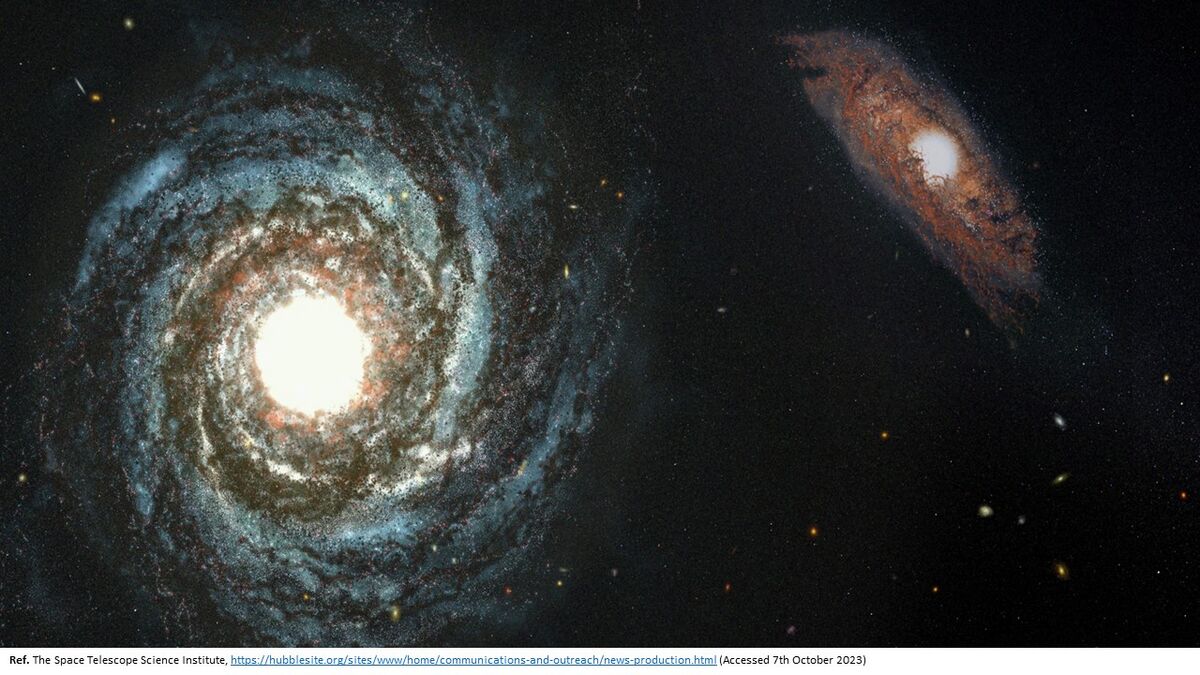
Roadmap Overview
Images show the Science and Earth Observation programs from the European Space Agency (ESA) and the National Aeronautics and Space Administration (NASA), indicating the needs for space mirror technologies.
Some critical elements enabling the LULMM include:
- large aperture, low-areal density and ultra-high stiff mirror substrates
- support structure
- mid/high-spatial frequency figure error
- segment-to-segment gap phasing
- mirror segment edges
- modeling and validation
Figure is showing the 5x5 Technology Matrix [Ref.1] with the position of 3LULMMFSM.
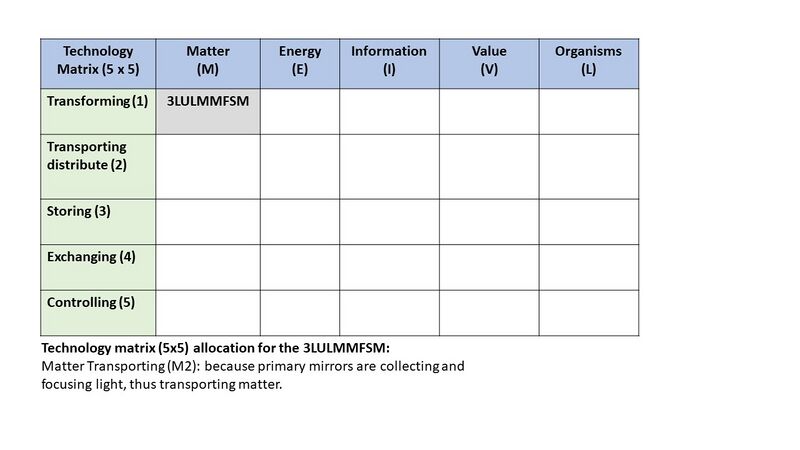
A significant amount of developments was carried out for ultra lightweight mirrors. Ball Aerospace demonstrated Beryllium mirrors with an aerial density as low as 9.8 kg/m2. However , this was for a diameter 0.5m and without guaranteeing sufficient stiffness in order to survive the launch, similar as for the JWST where the mirrors have to be re-designed with a final aerial density of 28 kg/m2, while the initial concept was aiming to achieve even below 15 kg/m2.
A primary mirror of JWST has 6.5 meters (21 feet 4 inches) across, which is needed to measure the light from distant galaxies. Building a mirror this large was challenging, even for use on the ground. This size of the mirror had never before been launched into space, in comparison the Hubble Space Telescope 2.4 meter mirror is shown, which would be too heavy concept to launch into orbit for the JWST. For the JWST the stiff and light mirror was essential, thus having very low aerial density to enable this mission concept and objectives.
Technology advancements are progressing and now future must be prepared to enable areal densities less than 10 kg/m2, for large mirrors located in an optical system entrance cavity (e.g., scan mirror, primary mirror). This would enable key factor in the production of large monolithic mirrors (>2 meters) and segmented designs usable for EO and JWST successor like missions, thereby securing high resolution imaging capability for space systems in e.g., geostationary orbit.
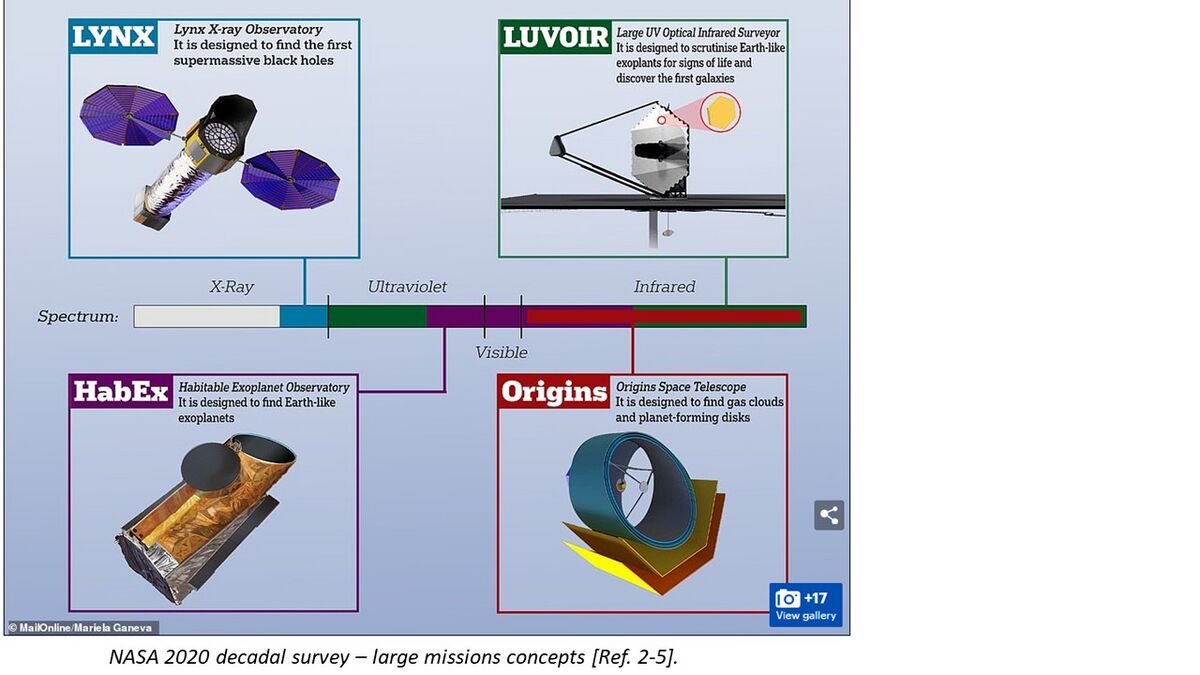
Space community, industry and agencies are addressing this gap seeking for next technological developments to enable low aerial density, ultra-high performance mirrors [Ref. 2-5] for:
- GEO mid.-high resolution observation
- Science missions
- Agile flat mirrors (Fast-steering, scanners…)
- ...
Design Structure Matrix (DSM) Allocation
The 3LULMM tree shows us that a Large Ultra-Lightweight Monolithic Mirror is part of a telescope structure (2TEL) to enable Earth Observation and Science Missions (1EOSM).
The other elements of telescope structure, Earth Observation, and Science Missions are not shown here. The DSM and tree both show that 3LULMM requires the following technologies at the subsystems level: 4RUSO Optical Facesheets, 4MBSS Support Structure, 4MASM Materials, 4JTEC Joining Methodologies, 4PMGP Precise Machining and Polishing, 4ISMC Isostatic Mounts, 4ULOC Optical Coatings, and 4MAVP Modeling with Validation. Each level 4 subsystem also depends on other 4 level subsystem technologies, which hilights high interdependencies and challenges.
Roadmap Model using OPM
The Object-Process-Diagram (OPD) of the 3LULMM Large Ultra-Lightweight Monolithic Mirros is provided in the figure below. This diagram captures the main object of the roadmap, its various processes and instrument objects, and its characterization by Figures of Merit (FOMs). The more detailed elements are already unfolded to show some sub-processes with supporting instrument objects.
An Object-Process-Language (OPL) description of the roadmap scope is auto-generated in the Object Process Methodology (OPM) and given below. It reflects the same content as the in the OPD, but in a formal natural language.
Figures of Merit
The table below shows a list of FOM by which Large Ultra-Lightweight Monolithic Mirrors (LULMM) can be assessed.FOM on this list relates specifically to the Earth Observation and Science Missions and targeted low aerial density with necessary thermal, optical, and mechanical performance. Consequently, additional FOM from enabling technologies (structural and thermal) related to the material selection (4MASM) that would drive the mirror design and implementation are highlighted.
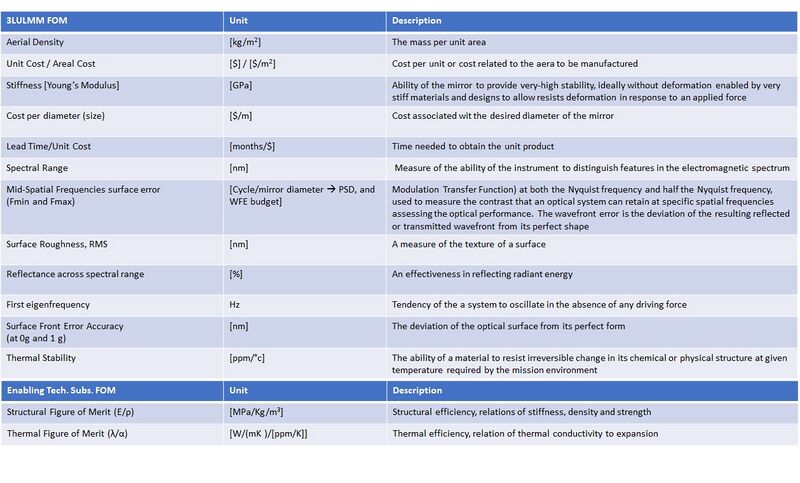
The table below gives some exemplary nominal reference values.
Important FOMs to achieve desired thermo-opto-mechanical performance are driven by generic equations/relations, design, and modeling. These are depicted in the table below.
Space agencies, notably NASA, carried out intensive developments for primary mirrors. Philipp Stahl when joining NASA, said [Ref 6-7], "When I joined NASA is 1999, the overriding mantra for Space Telescopes was Areal Density, Cost & Schedule". We can see in the figure below the targeted aerial density for the JWST with earlier demonstrators realized in the frame of the AMSD study. Several companies were working on parallel concepts, including KODAK or Ball Aerospace (recently acquired by BAE Systems), who built Beryllium mirrors with an aerial density as low as 9.8 kg/m2. However, this did not provide sufficient stiffness to upscale and survive the launch. Also, despite the initial requirements, the JWST mirrors have to be re-designed with a final aerial density of 28 kg/m2, while the initial concept aimed to achieve even below 15 kg/m2.
After several efforts and failures, many experts concluded that to achieve such a low aerial density necessary are thermal and mechanical FOMs driven by enabling low sub-system level technologies, as highlighted in the table above (Structural and Thermal FOMs for 4MASM). "Although I’ve come to think that Stiffness and Areal Cost are more important" (NASA Ref. 6-7).
Interesting developments were carried out for other mirrors, such as Herschel, the giant monolithic mirror (3.5 meters) for infrared astronomy missions manufactured in France. US companies began to work on SiC for space optics, including support coming from NASA. However, their primary focus was on SiC composites, and they failed to master the material properties, further abandoning these activities. The solution came by developing and manufacturing sintered silicon carbide in France, a very homogenous with low porosity and high mechanical strength. SiC powder is typically squeezed into solid blocks, where relatively soft blanks can be easily shaped into highly complex parts using computer-guided milling machines. The pieces are further placed into a furnace (approx. 2000°C) and baked into ceramics, then they become extremely hard and can be machined using diamond-headed grinding. The next important step was to invent the joining technology, which allowed the production of this gigantic mirror, as the SiC parts are typically small, with a maximum diameter of close to 1 meter achieved at that time. The French Nuclear Agency (CEA) developed the brazing joining technology that enabled 12 smaller segments to be joined together, thereby forming a 3.5 large mirror with an overall thickness of 3.5 mm and weight of 300 kg. The segments had to be shaped to optical precision with gaps between them of 10 microns.
However, the mirror achieved aerial density of the SiC blank less than 120 kg/m2, which is high compared to the further required progress. A surface shape test accuracy was better than 6 nm RMS, thickness inhomogeneity of the cladding layer was less than 5%, and the final surface figure error and roughness were 15.2 nm RMS and 0.8 nm RMS, respectively.
A material selection is crucial for very large mirrors and will be discussed in more detail in the technical model part. The mounting strategy and material properties must ensure the mirror will survive the launch and maintain its shape. The following properties and features can be concluded:
- Mechanical: stiffness, density, and ductility, which drive the mechanical stability of the optical system and are limiting factors for lightweight architectures
- Thermal: low CTE, thermal stability, infrared emissivity, and conductivity, which allow the avoidance of thermal gradients and secure stability
- Optical: achievable surface roughness associated with polishing capabilities and targeted spectral wavelengths
- Manufacturability, cost, and schedule: substrate materials that are affordable and available to allow the production of very large mirrors
Alignment with Company Strategic Drivers
Based on market analysis, FOMs, and future needs, the "company" strategy is to develop the concept of next-generation large ultra-lightweight mirrors for space missions, which are located in an optical system entrance cavity. This will enable future mirrors to be usable for EO and science missions, securing high-resolution imaging capability for space systems.
Positioning of Company vs. Competition
The large primary mirrors for space business are expensive and challenging to produce hardware, requiring highly skillful companies. Thus, there are only a few capable of providing these capabilities. The global telescope mirror market is witnessing many emerging trends, especially the increasing demand for lightweight mirrors, which enable space missions, improve handling launch capabilities, and often reduce cost. There is a growing preference for advanced materials, but there is no one material able to cover every mission. Depending on the required mechanical and optical performance on one hand and the thermal environment on the other hand, one material may exhibit better features than the others. There are some major market players, including Advanced Glass Industries (AGI, US), Corning (US, New York), Galvoptics (United Kingdom), BRD Optical (Germany), Telescopi Italiani (Italy), Bursh Welman (United States) who provide more standard and lower performance materials such as fused silica and borosilicate. Corning is one of the leading players in the mirrors, but various fields such as optical communications, display, and environmental technologies.
As earlier discussed, there are several critical technologies to enable the manufacturing of large ultra-lightweight mirrors for space missions. One of the technologies that combined several sub-technologies, such as high-stiffness of mirrors substrates, MFS, joining, etc., became the specific Silicon Carbide (SiC) developed by Boostec Mersen (called BOOSTEC® SIC) in collaboration with Airbus, including one the key and first application for Herschel Mission ( 3.5 m Sic Mirror). At that time, the next generation of EO and Science missions required a significant increase in performance on a different FOM (structural, thermal…) to mainstream the mirror product. The company follows the attacker and pioneer strategy, introducing a new disruptive and enabling technology without which the subsequent infrared astronomy missions could not occur. The technology was sought for this giant Herschel mirror, where classical materials such as aluminum and carbon fiber were unsuitable for performance, while glass materials were too heavy. Regarding silicon carbide for space missions, Boostec has oligopoly as their material, which has other properties compared to other available silicon carbides, and knowledge with long-term partners makes it unique. Boostec SiC® is enabling highly demanding requirements to design mechanically and thermally ultra-stable space optics, thereby appearing to be a material of choice, even unavoidable for some space telescopes. Some examples include Sentinel-2, the recently launched Euclid mission to study the dark Universe and Aeolus for Earth Observation, NIRSpec large spectrograph for NASA JWST, and many other telescope mirrors. The ESA figure below from Space Days shows the “ground-breaking solution” enabled by a unique and deep technological partnership between Mersen Boostec & Airbus, positioning Europe as a world leader in large-scale SiC solutions.
Moving further to the space mirrors for high-performance science and earth observation missions, we can distinguish other materials. Another one is Beryllium, which is typically considered for mirrors in cryogenic applications, as it combines a high stiffness with low density and high thermal conductivity. However, the CTE at room temperature is very high (around 11 ppm) and thus unsuitable for thermally stable structures across high-temperature ranges. This drops to around zero at cryogenic conditions; hence, it has been selected as the substrate for the James Webb Space Telescope (JWST) mirrors. Consequently, its contribution to the overall applications and space market is low, including its toxic nature.
The other related FOM, which favors thermal efficiency (CTE close to 0) and caused duopoly in the mirrors for science and high-resolution EO missions, is related to Zerodur® material and ULE® (low expansion glass-ceramics), but having worse properties.This unique low thermal expansion glass material is offered by Schott GmbH, a worldwide leading company whose strategy is focus on reinventing specialty glass and glass-ceramics, with three key goals: “to be pioneers, develop high-tech solutions with our customers, and assume responsibility for society and the environment.” This material has an excellent polishing capabilities and can be manufactured in a variety of sizes and shapes, from tiny prisms to meter-sized mirror blanks. Both Boostec and Schott dominated the space mirror market for high-demanding space missions.
The highly skillful mirrors would only be achievable with coating and precise polishing. Integrating polishing techniques enables exact finishing and higher accuracy in producing mirror blanks. The increasing popularity of space and astronomy is fueling the demand for mirrors in the coming years. The Safran REOSC is the world leader in high-performance optomechanical systems, focusing on mirrors and including uniquely developed solutions for Boostec Silicon Carbide® and Schott Zerodur®. Their current capabilities include polishing, controlling, and coating high precision optics to the nanometer accuracy and large sizes up to 4-meter diameter, which is not achievable by competitors. Independently of the industrial setup, Safran REOSC is usually a favorable candidate for coating and polishing, thus making an oligopoly in this area. A good example is even the European Space Observatory (ESO) gigantic telescope (ELT), the largest telescope ever built in Chile, which consists of Boostec Silicon Carbide® used for the reference structure of its M4 adaptive optics and also its fast tip/tilt M5 folding mirror. The other mirrors are made of Schott Zerodur®, whereas Silicon Carbide and Zerodur were coated and polished by Safran REOSC with their know-how and developed enabling technologies. Likewise, Mersen Boostec and Schott, Safran REOSC has been pursuing the pioneering strategy for many decades and constantly adapts to the market being on the front end.
The table shows a summary of the competitor analysis with a focus on the large-ultralightweight monolithic mirrors for space missions and distinguish among: • Duopoly between Boostec Mersen® and SCHOTT (founded in Jena, Germany), who use two unique materials suitable for high-performance scientific and EO missions. • Safran Reosc oligopoly in handling and processing large mirrors with uniquely developed coating and polishing technologies.
For mirror blanks, other indirect and direct competitors usually focus on more common glass or glass-ceramic materials (BK7, fused silica…), whereas for polishing and coating other companies are limited to more classical materials and smaller dimensions (.e.g. Magneto-Rheology Figuring <1 m mirrors).
Various FOMs and enabling sub-technologies were hilighted earlier, and the first tradespace is realized here.The figure below shows the relation of enabling material mirror blank technology (Structural vs Thermal FOM). The green curves represent the iso-performance when considering the product of the two figures of merit. At first order, it brings in evidence two families of material: (1) Boostec SiC® and Schott Zerodur® demonstrate the best characteristics for mirrors, and (2) Beryllium, Si3N4, ULE, and Cordierite are materials of interest as well but with lower global performance. There is not a unique material able to cover every mission. Depending on the required mechanical and optical performance on one hand and the thermal environment on the other hand, one material may exhibit better features than the others. However, this unveil driving technological strategical advantages. Moreover, the Figure shows the figures of merit, split into two domains by the dotted line. 1 – The upper left favors structural efficiency, so we find materials with high stiffness, low density, and generally good strength capabilities but which are more sensitive to the thermal environment due to their “nonnull” CTE. Their CTE depends on the temperature; some can also demonstrate very low CTE in cryogenic environments (i.e., Beryllium, SiC). 2 – The second one on the lower right favors thermal efficiency. We will find material with CTE close to 0. So, they won’t be sensitive to the thermal environment but generally demonstrate lower strength and stiffness.
Technical Model
Financial Model
List of Demonstrator Projects
Key Publications, Presentations and Patents
Technology Strategy Statement
References
1. Olivier L. De Weck, Technology Roadmapping and Development, A Quantitative Approach to the Management of Technology, Springer Nature 2022.
2. Geyl, R. and Ruch, E., 2021, June. Progress in ultra-lightweight glass ceramic space optics. In International Conference on Space Optics—ICSO 2020 (Vol. 11852, pp. 79-89). SPIE., https://doi.org/10.1117/12.2599147
3. Vecchi, G., Basso, S., Civitani, M., Ghigo, M., Pareschi, G. and Salmaso, B., 2019. Thin glass shells for active optics for future space telescopes. CEAS Space Journal, 11(4), pp.533-541., https://doi.org/10.1007/s12567-019-00259-7
4. C. Devilliers, C. Du Jeu, V. Costes, A. Suau, N. Girault, L. Cornillon, “New design and new challenge for space large ultralightweight and stable Zerodur© mirror for future high resolution observation instruments”,Proceedings Volume 10563, International Conference on Space Optics — ICSO 2014; 105631I (2017) https://doi.org/10.1117/12.2304187
5. P. Gloesener, F. Wolfs, M. Cola, E. Wachtelaer, C. Flebus, “Optics for EUCLID telescope: challenges and developments”, Proceedings Volume 11451, Advances in Optical and Mechanical Technologies for Telescopes and Instrumentation IV; 114510L (2020) https://doi.org/10.1117/12.2562807.
6. Stahl, H. Philip, 50 Years to NASA M.irror Technology Development: From Hubble to JWST and Beyond, 6th International Symposium on Advanced Optical Manufacturing and Testing Technologies. (AOMATT 2012)
7. Stahl, H. Philip, Advanced ultraviolet, optical, and infrared mirror technology development for very large space telescope, Journal of Astronomical Telescopes, Instruments, and Systems, 6(2). 025001 (2020), doi: 10.1117/1.JATIS.6.2.025001.
8. Dave Baiocchi, H. Philip Stahl, Enabling Future Space Telescopes: Mirror Technology Review and Development Roadmap.
9. P. Y. Bely, The Design and Construction of Large Optical Telescopes, Springer (2003)
10. Feinberg, Lee, et. al., “NASA Capability Road Map (CRM) 4: Advanced Telescope and Observatory (ATO)”, NASA capability road map report (2007).
11. Kaifu, N. et. al., “The first light of the Subaru telescope: a new infrared image of the Orion Nebula”, Publ. of the Astronomical Society of Japan, vol. 52, (2000).
12. J. Nelson, “Segmented mirror telescopes”, Optics in Astrophysics, 198, (2006). DOI: 10.1007/1-4020-3437-7.
13. H. Philip Stahl, P. Sumrall, R. Hopkins, “Ares V launch vehicle: An enabling capability for future space science missions,” Acta Astronautica, In Press, Corrected Proof, Available online 27 February 2009, ISSN 0094-5765, DOI: 10.1016/j.actaastro.2008.12.017.
14. Stahl, H. Philip, "Design study of an 8 meter monolithic mirror uv/optical space telescope", SPIE Astronomy Conference, Marseille, France, June 2008.
15. H. Philip Stahl, “Mirror technology roadmap for optical/IR/FIR space telescopes”, Proc. SPIE, 6265 (2006), DOI: 10.1117/12.671958
16. M. W. Werner, et. al., “The Spitzer Space Telescope mission,” The Astrophysical Journal Supplement Series, 154, (2004), DOI: 10.1086/422992.
17. P. Yoder Jr., Opto-mechanical Systems Design, 2nd ed., Marcel Dekker (1993)
